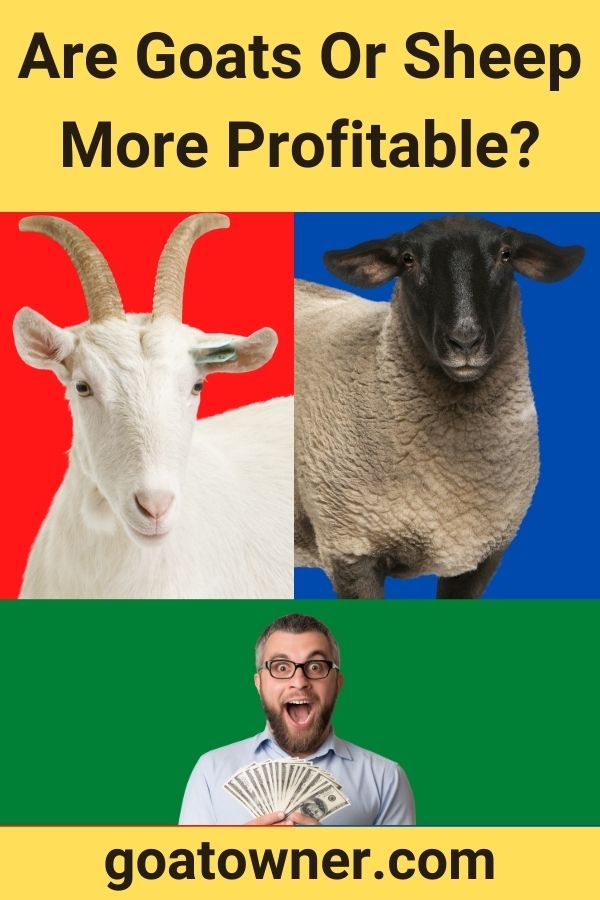I’ve always been a simple homesteader with my interests purely in the realm of companions.
My goats are here because I enjoy caring for them, and that’s always going to be the way.
But that’s obviously not why most goats are reared across the world.
Recently, I was having a debate with a friend about which was more profitable for farmers—goats or sheep.
We couldn’t agree on the final verdict, so I decided to look into it and try and get a bit of clarity.
So, are goats or sheep more profitable?
It will depend a bit on your land. If you’ve plenty of grass for the flock, sheep will be more profitable. If there’s more roughage and forage available in browse, you will do better with goats. Generally speaking, goats are more profitable, though.
So, while it’s important to note that it does depend a bit on your circumstances, when you look at the numbers, goats globally generate far more profit.
This is for a whole host of reasons, not to mention that goats are cheaper to buy, raise and own.
Let’s look further into this.
Are goats profitable to keep?
Yes, they certainly are.
Goats are among the most widely raised livestock in the world, with around 1 billion individual goats alive today.
Naturally, they are hugely profitable, or they wouldn’t be so many of them!
Goats provide two primary resources: meat and milk.
They are also devoured for their fiber, though not as much as sheep.
Any of these is a route to profit.
The thing about the abundance of goats is that this makes them very cheap to buy, if you aren’t as interested in pedigree.
Initial set up costs can be kept to a minimum.
Then comes the variable factor.
What does your land look like?
If you have a naturally wild pasture with plenty of roughage for your goats to forage for, then you can essentially leave them to it when it comes to food.
You should ideally provide some additional nutrients, but the bulk of their diet can be provided for by the land itself—at least in the spring and summer months.
In the winter you’ll need to buy hay.
Otherwise, you’ll need to feed them hay year-round, which will take a considerable chunk out of your profits.
But they’re still profitable in this case.
What about sheep?
Are sheep profitable to keep?
Again, naturally—there are also around 1 billion sheep in the world, and they are one of the most common sources of naturally occurring fiber commercially available.
The main difference between goats and sheep is that sheep are primarily used for fiber production.
They are of course used for meat, too, though less commonly.
Sheep are grazers, as opposed to foragers or ruminants.
Goats look around for things like flowers, tubers, roots, and other material they can eat.
Sheep more or less exclusively eat grass.
So, if you have quality grass available for even most of the year, then keeping sheep is far easier than feeding goats hay constantly.
In this case, sheep may well be more profitable.
Harvesting sheep for their resource is a lot more labor intensive, and requires a lot more skill.
So, more training goes into it, but when circumstances are favorable, sheep are one of the most profitable animals you can keep.
| Related Posts |
|---|
Are goats easier to keep than sheep?
Again, it really depends.
Your biggest job with either animal is going to be their food.
If you have land that would be more naturally suited to a grazer rather than a forager, and vice versa, then it’s going to be a lot easier to cut out the feeding aspect.
Goats are much easier to handle, and generally much tamer.
Sheep tend to flee humans, whereas goats are much keener on interacting with you.
This makes routine procedures like trimming much easier.
By most metrics, then, sheep are easier to keep.
However, if you have land that sheep could graze on but not goats, then there’s more of a trade-off.
Which is the most profitable?
There’s a lot to consider, then, from the price of goats or sheep in your area, to the favorability of your land for each animal.
Each variable will have a big impact on potential profits, so you’ve got to really take the time to create a business model before you move forward.
Take every possible expense into account as they pertain to your particular circumstances.
I’m not talking about minor differences—there could be huge differences in potential profit for each animal.
That said, in general and taken purely as a numbers game, the answer is goats.
They provide a wider range of materials that are more widely consumed, and you can keep a good deal more of them on less land.
Whichever you choose, though, they aren’t going to be profitable on their own—you need to carefully plan every aspect, and how you are going to make them profitable.
If you want a simple answer, then, it’s goats.
Goats have a lot of advantages that sheep just don’t, for a wide variety of reasons.
When looking at the big picture of the whole world, though, played as a numbers game, goats are the more profitable option.
But that doesn’t mean that in your circumstances, sheep couldn’t potentially be more profitable on your land.
Making profit from either certainly isn’t easy, and requires a lot of forward planning.
Know your business, and either will be profitable.

